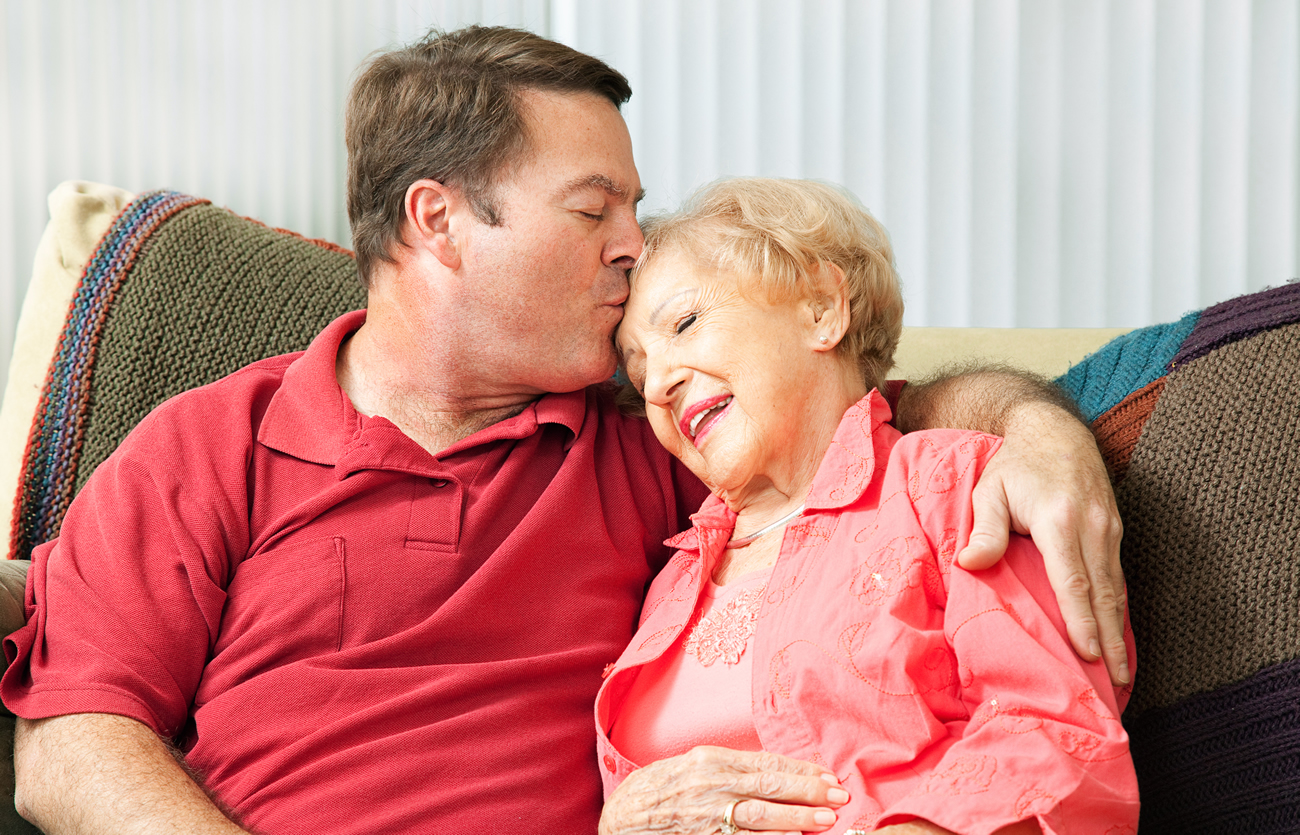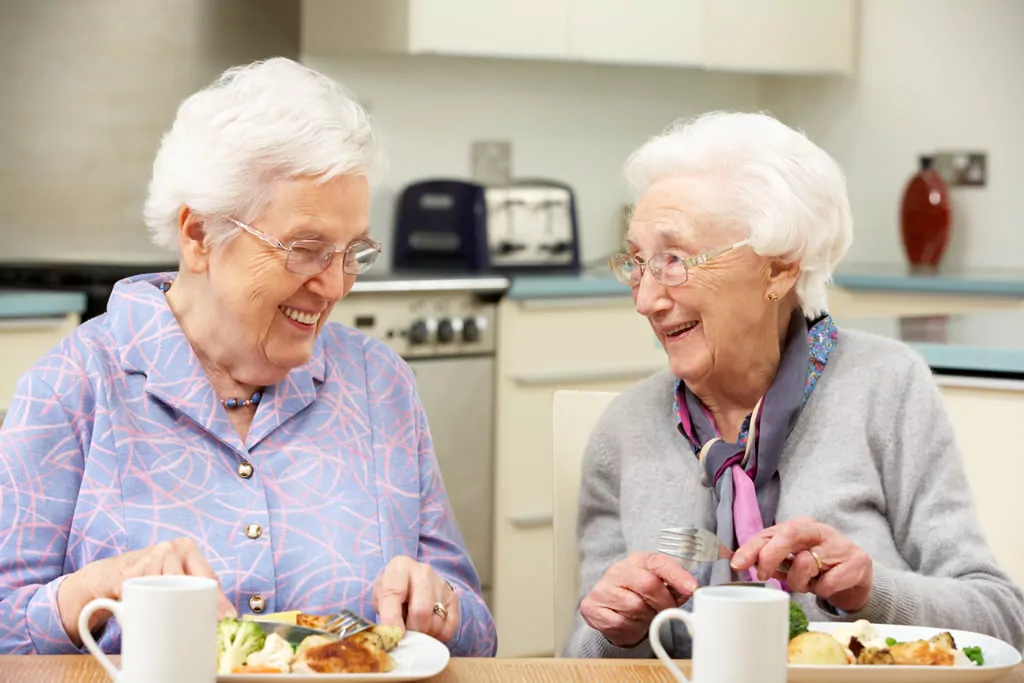- 30-day money-back guarantee
- No contract or commitment required
- Special promo: AARP and Military Veterans get one month FREE!
No contract or commitment required

The sandwich generation. We have heard that term and know what it means, but we never really understand the impact of that label until we’re part of it. As adult children, we may not fully comprehend the extent to which our parents’ aging will affect them or how it will affect us. But aging is a fact of life and it affects all families. If our parents are already seniors and in good health, living independently, we may not feel any significant changes or develop any significant concerns. However, the time does eventually come when the effects of their aging become more evident and supportive care may be needed.
During the aging process, our parents may experience an overall decline in physical and/or mental vitality, resulting in visible and functional changes to their appearance, standards of living, cognitive abilities, physical endurance, and emotional well-being. The more aware we are of how aging can affect them, and what options are available to them as seniors and to us as caring adult children, the better for all of us. The good news is that we do not have to face these challenges on our own, as there are plenty of support systems and resources that can help us along the journey.
There are other compounding health issues that have the potential to affect one’s independence as one ages. Examples of some of these challenging issues include:
Falls, in particular, are dangerous in the elderly, but they’re also highly preventable. According to the Centre for Disease Control, 36 million adults over the age of 65 fall annually, resulting in over 32 thousand deaths. Furthermore, one in five falls causes injury, including broken bones and head injuries.
It is difficult to plan ahead for this transitional aging process because we just don’t always know, or want to know, what to expect. A great way to start is to take inventory of current health states, taking into consideration a parent’s emotional, mental, and physical well-being.

These are the tasks needed to ensure the dignity and physical and emotional well-being of our elderly parents; the tasks needed to meet their daily living requirements. If there is impaired mobility and/or health issues that make it difficult or impossible for them to achieve these ADLs independently, then you will need to engage the required assistance, whether from a care provider or from the use of supportive equipment. The basic ADL activities are typically listed as:

These are the tasks of daily living that are not considered fundamental but are related to independent functioning. Again, it is important to the overall well-being of elderly parents that their IADLs are taken care of effectively and consistently. IADLs most often refer to the following types of activities:

It is important to look at what our parents call ‘home’ and discuss with them if it is the best and safest place for them to continue to age. There are lifestyle and financial issues to consider, but also safety and socialization issues that are important too. This can be a stressful, but very necessary, conversation as we work together to provide the best care possible for our parents. Some living options include:

Regardless of the living arrangements deemed best for our parents, there are a number of ways in which to further assist them in their daily lives; support that can be provided wherever they call home. Some of these are financially provided through insurance or government agencies, others are only available through private payment arrangements.
There are financial implications that need to be considered when making the necessary changes and choices that we need to support the well-being of our aging parents. They may be eligible to receive financial support from government programs to offset their living expenses, but it takes some time and effort to investigate these options. They may also need some assistance in managing their finances and retirement funds and estate planning. Consider hiring a professional financial planner, especially one with “eldercare” as part of their offering, to review their current financial state and work with us and our parents to create a plan for the future.
Further, if we become a primary caregiver, we may be eligible to get some tax relief by claiming an elderly parent as a dependent or deducting medical expenses. There are various federal, state and/or independent groups that provide free tax assistance to seniors that can be further investigated.
Education and Resources
The official benefits website of the US Government, Benefits.gov has information on over 1000 benefit and assistance programs covering health, disability, income, wealth/owned property: https://www.benefits.gov/
Area Agency on Aging is a federally mandated agency in your county or city that is staffed by professionals that know every senior program, service, and funding in your area. It’s a great starting point to gather information: https://www.n4a.org/
The National Council on Aging is the nation’s most comprehensive web-based service where you can search benefits and programs for seniors with limited income and resources: https://www.benefitscheckup.org/
Looking Forward
As adult children, we now find ourselves in a position of being as committed and devoted to our parents’ well-being as they have been for us all of our lives. It’s a strange changing of the guard, and few of us are ever really prepared for the process, but it shouldn’t be a burden or responsibility to bear alone. There is support, and hopefully, this article provides some ideas and information on where to start planning for the inevitable. The take-away should be that there are many choices and options available to allow our parents to age well and happily.

Cheri McEssy is a Nurse Executive and former owner of BrightStar Care of Chicago. She has extensive healthcare knowledge and experience, both clinically and in the senior care space.
Our mission is to extend independence with dignity for millions of vulnerable people. Read more
©2015-2024 UnaliWear Inc.
UnaliWear’s RealFall™ Fall Detection and additional proprietary technology are protected by the following US and International Patents: US Patent 10,051,410 and US Patent 10,687,193 * Mexico Patent 363492 * Australia Patent 2014321303 * Japan Patent 6346953 * China Patent 105765639 * European Patent 14845754 * Israeli Patent 244489 * Canada Patent 2,923,745

All AARP members and Military Veterans receive a free month added onto the end of the first year of service (offers cannot be combined). Simply indicate your appropriate status in the Referral/Promo box during checkout or mention it when ordering over the phone (888-343-1513).
UnaliWear’s patented RealFall™ technology is based on actual fall data from Kanega Watch wearers and gets smarter about each wearer’s personal movements over time— continuously improving fall detection accuracy and limiting/eliminating false alerts. No other medical alert system offers this real fall/related movement learning and continuous improvement technology. Click here to learn more.